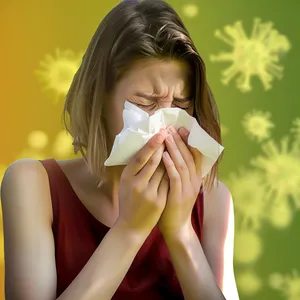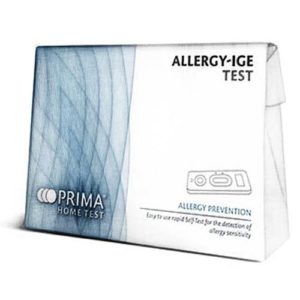Allergies are an overstimulation of our immune system to allergens in our surroundings. An allergic person’s immune system searches daily for non-threatening allergens that might be a threat and then produces a reaction that results in allergic symptoms.
It is estimated that around 25% of adults and up to 40% of children will develop allergies during the course of their lives. The usual allergies that kids develop usually disappear as they age and their immune system improves, however, allergies can develop at any time in our life. Some of the most common allergies include, egg allergies, milk allergy, cat allergies, dust mite allergies, and general food allergies.
While allergies may seem like just a nuisance, they can actually significantly impact daily life. Constant sneezing, itchy eyes, and difficulty breathing make it hard to focus at work or school. Severe allergies like nut or bee sting allergies can even be life-threatening without quick treatment. Don’t just resign yourself to “living with” allergy symptoms! Make an effort to identify your triggers through allergy testing. That way, you can take steps to avoid exposure and prevent reactions.
For example, if you’re allergic to pollen, check pollen forecasts and stay indoors when counts are high. Use high-efficiency particulate air (HEPA) filters to remove allergens from your home. If you’re allergic to certain foods, always read ingredient labels carefully. A bit of prevention goes a long way towards allergies not controlling your life. And for occasional flare-ups, over-the-counter antihistamines can provide relief. Don’t let allergies keep you from enjoying all life has to offer!

Allergies also seem to be genetic. You will probably develop allergies if members of your immediate family have them, but this is not always the case.
Allergies can be both annoying and life-threatening. Common symptoms of allergies include runny nose, itchy eyes, hives, and difficulty breathing. The severity of symptoms can vary from person to person, and some allergies can even lead to anaphylaxis, a severe and potentially deadly reaction.
It is crucial for people with allergies to be aware of their triggers and take necessary precautions to avoid them. Some common ways to manage allergies include taking antihistamines, using nasal sprays, and carrying an epinephrine auto-injector for emergency situations.
As our environment changes and new allergens emerge, the prevalence of allergies continues to rise. It is important for researchers and medical professionals to continue exploring ways to prevent and treat allergies so that everyone can live a healthy, allergy-free life.
Can We Prevent Allergies from Developing?
One of the best ways to prevent allergies from developing is to provide babies and children with the correct “anti-allergy” approach from the very beginning.
A diet that is nutritious and balanced is the usually the best approach for living a lifestyle that is healthy, and doing this during pregnancy will help to minimise the risk passing allergies onto the baby. Consuming allergic foods like nuts and fish in moderate portions not only helps with foetal development, it also gives the foetus important nutrients.
Continuing to eat a healthy balanced diet after birth helps to pass on important nutrients via breast milk. Breast milk has been proven to be vital for a baby’s developing system and it can also transfer the mother’s immunity to fighting off infections.
When a baby is 4-6 months old, introducing tiny portions of allergic foods will help to strengthen their natural tolerance as they develop. These kinds of food should only be introduced one at a time, that way you will be able to pinpoint any allergic reactions. Consult with your child’s Paediatrician if you think your child has developed an allergic reaction to a specific food group.
The medical idea of ‘Hygiene Hypothesis’ is embracing kids playing in the dirt at a young age to help them improve their immunity. When children are encouraged to play outdoors, this will increase their exposure to germs and airborne allergens and this will also help to develop a strong immune system, which will be beneficial to them as they grow older.
To learn more, check out this informative article, written by NHS choices, that looks at the question: Are we too clean for our own good?
In addition to the above methods, some other preventative measures can also be taken. For example, keeping the house clean and free from dust and pet dander can help prevent allergies from developing or worsening. Regularly vacuuming and dusting, and washing bedding in hot water can help reduce the amount of allergens in the home.
Avoiding exposure to cigarette smoke and other air pollutants is also important in preventing allergies. Studies have shown that exposure to secondhand smoke can increase the risk of developing allergies and asthma.
Finally, staying up-to-date with vaccinations can also help to prevent allergies. Vaccinations help to stimulate the immune system and can prevent infections that can lead to allergies.
In short, there are several ways to prevent allergies from developing. These include a healthy and balanced diet, exposure to germs and allergens in moderation, keeping the home clean, avoiding smoking and air pollutants, and staying up-to-date with vaccinations. While it may not be possible to completely prevent allergies, taking these preventative measures can certainly help reduce the risk.

Home Allergy Test Kits
Suffering from allergies can be a frustrating and uncomfortable experience. It can cause sneezing, itching, and difficulty breathing, all of which can impact your life. But luckily, there are ways to manage allergies. One option is using a home allergy test kit, which is easy to use and gives reliable results. There are many different types of home allergy test kits to choose from, so you can find one that fits your specific needs. By using a home allergy test kit, you can figure out what you are allergic to and make informed decisions about your health. If you have symptoms like redness, rashes, or sneezing, it might be time to try a basic allergy test kit like the Prima Home Allergy Test Kit. If you need more help figuring out your allergies, you can try a specific test kit like the Cat Allergy Test Kit or the Airborne Allergy Screen Kit. For more information on allergies, check out our Allergy Testing FAQs.
Images by Anthony Cunningham for Zoom Health
Zoom Health is a leading UK supplier of Home Health Tests and Earplugs





